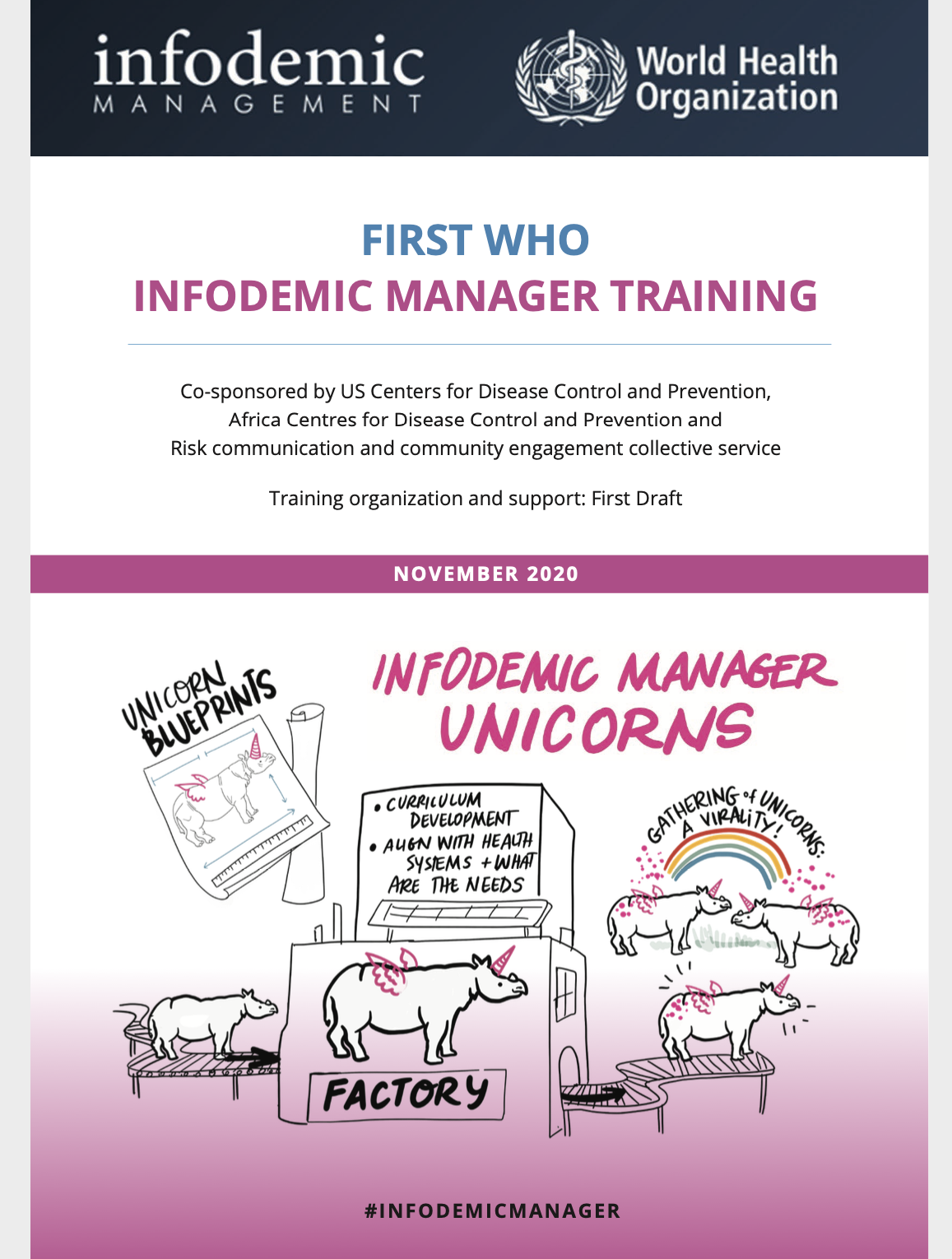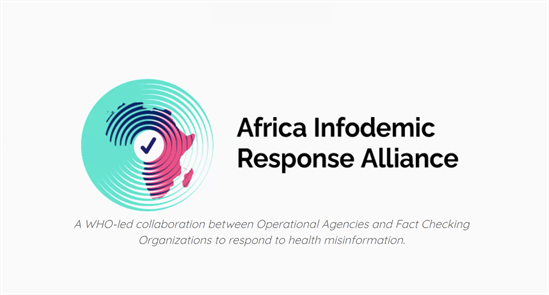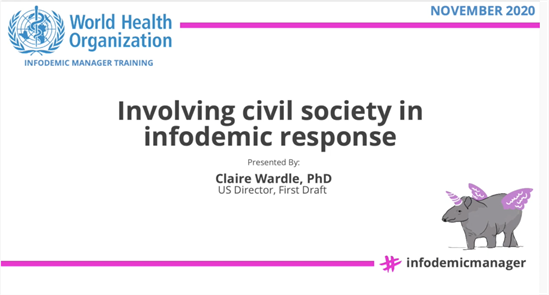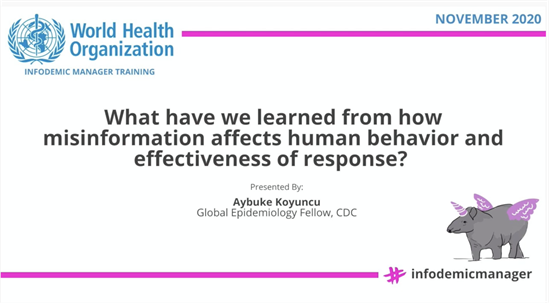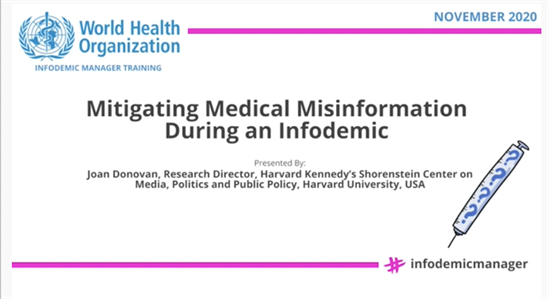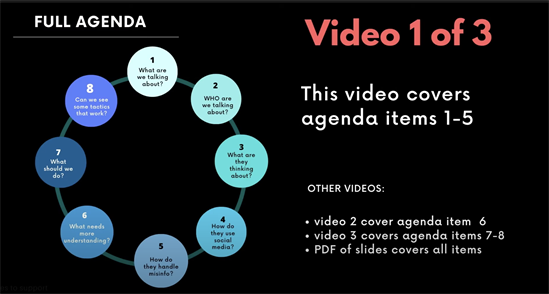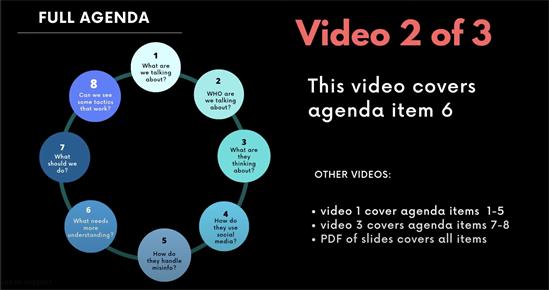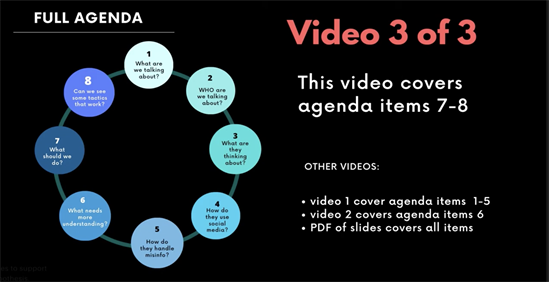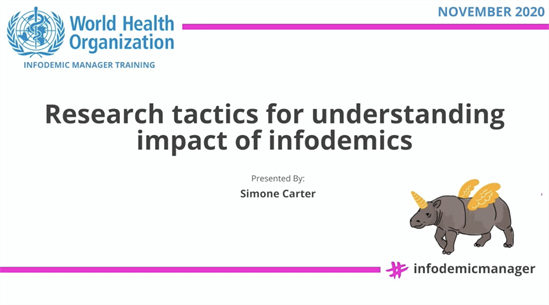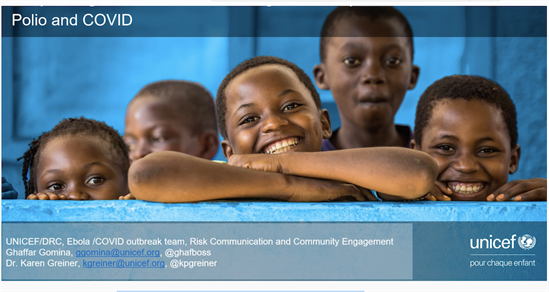
1st WHO Infodemic Manager training
November 2020
WHO has partnered up with US Centers for Disease Control and Prevention, Africa Centres for Disease Control and Prevention, and RCCE collective service, to prepare the first WHO training in infodemic management, supported by First Draft.
The intent is to cover a spectrum of infodemic management skills and topics focused on skills needed to apply infodemic management interventions and practice to promote resilience of individuals and communities to the infodemic, including misinformation, and to promote self efficacy of individuals for self-protective health behaviors. The training will encompass both global and region-specific topics in the infodemic and health misinformation.
Target competencies – infodemic managers should be able to:
- Measure and monitor the impact of infodemics during health emergencies
- Detect and understand spread and impact of infodemics
- Respond and deploy interventions that protect and mitigate the infodemic and its harmful effects
- Evaluate infodemic interventions and strengthen resilience of individuals and communities to infodemics
- Promote the development, adaptation and application of tools for the management of infodemics
Over 740 applications were received and 275 were selected to be part of the first cohort of trainees.
Those that will successfully pass the course assessment will become part of the WHO roster of infodemic managers, to support technical assistance in countries in infodemic management and response to health misinformation.
Some lectures will be made available on our web site here over the course of November.
Voice of Infodemic Managers' from the 1st WHO Infodemic Manager training
Training videos
Health misinformation and infodemics: a framework approach to Infodemic Management
Tina Purnat, WHO and Elisabeth Wilhelm, US CDC
Practical considerations and skills labs
Ethics in planning interventions and researching for infodemic management
Theresa M. Senft, Macquarie University, Australia
Research tactics for understanding impact of infodemics in vulnerable or at-risk populations, especially communities which are hidden or un-networked
Simone Carter, Manager, Social Sciences Analytics Cell (CASS) and Integrated Multidisciplinary Outbreak Analytics (IMOA), UNICEF Public Health Emergencies
Mitigating Medical Misinformation During an Infodemic
Joan Donovan, Research Director, Harvard Kennedy’s Shorenstein Center on Media, Politics and Public Policy, Harvard University, USA
Behavioral science and mental heuristics and how they affect design of research and interventions
Neetu Abad, Behavioural Scientist, Global Immunization Division, Centers for Disease Control and Prevention USA
UX and Designing for friction: making it harder to share misinformation, and easier to share accurate information with user testing and design tweaks
Claudia Pagliari, Senior Lecturer in Primary Care and Informatics/Programme Co-Director (MSc Global eHealth), Usher Institute – Global Health Academy, University of Edinburgh, UK
*video pending
Skills Lab - Leadership skills for infodemic management
Anna Callaghan, Mame Afua Akyeampong and Breanna Broughton, STOP programme, US CDC
Tina Purnat, WHO and Elisabeth Wilhelm, US CDC
*video pending
Skills Lab – Cheap and fast tools for analysis of the infodemic
Claire Wardle and Rory Smith, First Draft
▶ VideoSkills Lab - Fact checking process and tools
Tom Trewinnard, Consultant, WHO Regional Office for Africa
▶ VideoSkills Lab - Pretesting content and incorporating user feedback
Joe Smyser, The Public Goods Project, USA
Social network analysis for infodemic management
Angus Thomson, Senior Social Scientist: Demand for Immunization, United Nations Children's Fund (UNICEF)
Joe Smyser, The Public Goods Project, USA
Skills Lab: Using CrowdTangle to understand online conversations
Asha Phillips, CrowdTangle
Lauren Balog Wright, CrowdTangle
Skills lab: Facebook Data for good and Social Connectivity Index
Alex Pompe, Research Manager, Data for Good team, Facebook
Skills Lab: Using data correctly in infographics and visualizations
Carlotta Dotto and Claire Wardle, First Draft
I Boost Immunity and Kids Boost Immunity – inspiring learning through global citizenship
Ian Roe, British Columbia Centre for Disease Control (BCCDC), Canada
Skills Lab – Google tools to analyze infodemic
Maggie Farley, Anna Freeland, Simon Rogers, and Trinna Leong; Google
Public health experience of infodemic before COVID-19
Infodemic time machine: What have we learned from how misinformation affects human behavior and effectiveness of response
Aybüke Koyuncu, PHI/CDC Global Health Fellow, Centers for Disease Control and Prevention, USA
In conversation with Sylvie Briand, WHO
▶ VideoLearning from 1918 Spanish flu for better infodemic response in COVID-19
John Barry, author of The Great Influenza
In conversation with Sylvie Briand, WHO
▶ VideoA tale of two pandemics: Applying what we’ve learned from combating HIV stigma & misinformation to the COVID-19 response
Dimitri Prybylski, US CDC
▶ VideoResponding to the Infodemic: Experiences from Ebola, Polio and other outbreaks
Ghaffar Gomina and Karen Greiner, UNICEF DRC
▶ VideoHow misinformation is connected to the overall vaccination demand and programme implementation
Susan Mackay, GAVI
▶ VideoTobacco and the infodemic
- Rüdiger Krech, Director, Health Promotion
- Vinayak Prasad, Unit Lead, No Tobacco Unit
- Kerstin Schotte, Medical Officer, No Tobacco Unit
The Infodemic: Understanding the Health Gender Digital Divide
Nnenna Nwakanma, World Wide Web Foundation
▶ VideoCulture and Infodemic
Pier-Luigi Sacco, Professor, Department of Humanities Studies, IULM University, Italy
▶ VideoCountry and regional experience
Africa Infodemic Response Alliance
AbdelHalim AbdAllah (Halim), WHO Regional Office for Africa
▶ Video
How have South-East Asian countries responded to the infodemic
Supriya Bezbaruah, Technical Officer, Risk Communications, WHO Regional Office for SE Asia
▶ VideoInfodemic in Thailand
Viroj Tangcharoensathien, Senior Adviser to International Health Policy Program (IHPP), Ministry of Public Health, Thailand
▶ VideoInfodemic in Canada and Quebec
Eve Dube, Researcher, Institut national de santé publique du Québec, Canada
▶ VideoCounting & countering the infodemic in Aotearoa New Zealand: global issues, situated solutions
Kate Hannah, Deputy Director, Equity and Diversity Te Punaha Matatini, University of Auckland Te Whare Wananga o Tamaki Makaurau, New Zealand
▶ VideoInfodemic in Sri Lanka
Sahani Chandraratna, Health Promotion and Communications Officer, WHO Sri Lanka
▶ VideoInfodemic in Indonesia
Santi Indra Astuti, Communication Studies Faculty, Bandung Islamic University (Universitas Islam Bandung), Indonesia
▶ VideoIntroduction to emergency response structures and environment
Emergency response environment and infodemics
Seven habits of successfully working in infodemic management
Neville Calleja, Director, Directorate for Health Information and Research, Ministry for Health, Malta
▶ VideoPublic Health and Epidemiology in context of infodemic response
Dimitri Prybylski, Team Lead, Demand for Immunization team, Global Immunization Division, US CDC
▶ VideoInvolving civil society in infodemic response
Claire Wardle, Co-Founder and Director, First Draft
▶ VideoInternational Health Regulations (2005), emergency preparedness and response
Carmen Dolea, Medical Officer, IHR Secretariat, WHO
▶ VideoRisk Communication and Community Engagement
Melinda Frost, Technical Officer, High Impact Events Preparedness, Global Infectious Hazards Preparedness, WHO
▶ VideoWorking with media, journalists and tech industry in message dissemination
Janet Kincaid & Andrew Pattison, Technical Officer, Department of Communications, WHO
▶ Video
